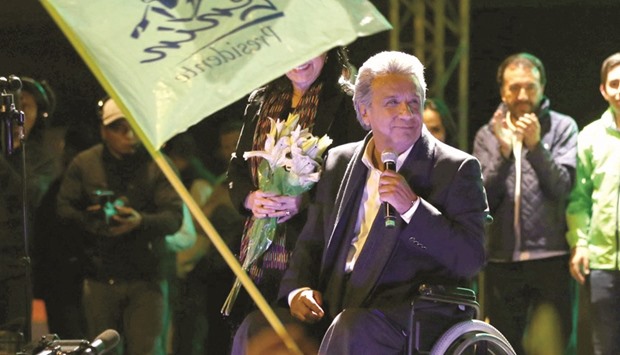Ecuador’s leftist government candidate Lenin Moreno looked set for victory yesterday in a presidential election, but slow results meant it may take days to know if he will face a runoff with former banker Guillermo Lasso.
In a nail-biter vote with eight candidates at the weekend, Moreno was close to the threshold needed to avoid a second round on April 2 and continue a decade-long period of leftist rule, just as South America is moving to the right.
While Ecuadoreans are angry over an economic downturn and corruption scandals, the opposition split its votes among candidates and the ruling Country Alliance remains popular with many poor voters thanks to social welfare programmes.
As results trickled in from Ecuador’s Andes, jungle, and Pacific coast, Moreno, a disabled former vice president, was just short of the 40% of votes and a 10-percentage-point difference over his nearest rival to win outright.
He had 39.12% of valid votes versus 28.30% for Lasso, with 88.5% of votes counted, the official preliminary election count showed yesterday morning.
The electoral council said final results would only be ready in three days as votes trickle in from isolated areas and Ecuadoreans abroad, bureaucratic delays and “inconsistencies” in some ballots.
“How can they take three days to count 12%?” said Lasso, 61, who already celebrated reaching the second round in his humid hometown of Guayaquil under a stream of confetti on Sunday night.
“We’re not going to allow fraud...If they toy with the results, we’ll take to the streets,” he added.
A couple of hundred opposition supporters have already congregated in front of the electoral council headquarters in Quito to demand a speedier and more transparent count.
“We don’t trust the electoral council, it’s obviously pro-Country Alliance,” said Maribel Cevallos, a 34-year-old psychologist. “We’re here watching that they don’t cheat us.”
Protesters waving yellow, blue and red Ecuadorean flags chanted slogans including “We’re not Cuba or Venezuela, out with Correa!”
Outgoing President Rafael Correa was one of the key figures in Latin America’s leftist axis that includes Caracas and Havana.
He brought stability to the politically turbulent Opec country but has aggravated many with his confrontational style.
Government supporters said votes from pro-government rural provinces and Ecuadoreans abroad, many of whom left after a deep financial crisis under a centre-right government, would propel Moreno, 63, past the crucial 40% mark.
Moreno said in an interview yesterday he does not see why the opposition would cry fraud, adding his party was abiding by the constitution and would await final results.
The next president faces strong pressure to create jobs and crack down on graft, amid corruption scandals at state-run oil company Petroecuador and Brazilian conglomerate Odebrecht.
Lasso has campaigned on a platform to revive the economy, which is dependent on exports of oil, flowers and shrimp, by slashing taxes, fostering foreign investment and creating a million jobs in four years.
He has also vowed to remove Wikileaks founder Julian Assange from the Ecuadorean embassy in London and denounce Venezuela’s Socialist government.
But Lasso has also alienated some voters who deem him a stuffy elitist linked to the 1999 financial crisis when hundreds of thousands lost their savings.
Moreno, who lost the use of his legs two decades ago after being shot during a robbery, has a more conciliatory style than the pugnacious Correa and has promised benefits for the disabled, single mothers and the elderly.
“In the last few years there have been radical changes in the country, like the end of extreme poverty,” said Moreno supporter Ramiro Flores, a 60-year-old civil engineer in the mountainous capital Quito.
Critics say Moreno is woefully ill-equipped to overhaul an ailing economy hit by low oil prices, steep debts, and a stronger US dollar that has hurt exports.
His running mate, Jorge Glas, who as strategic sectors minister oversaw the oil and infrastructure industries, has also been accused by a fugitive oil minister of corruption in the Petroecuador case.

Lenin Moreno, candidate of the ruling PAIS Alliance Party, celebrates the early results of the presidential election with supporters in Quito.
